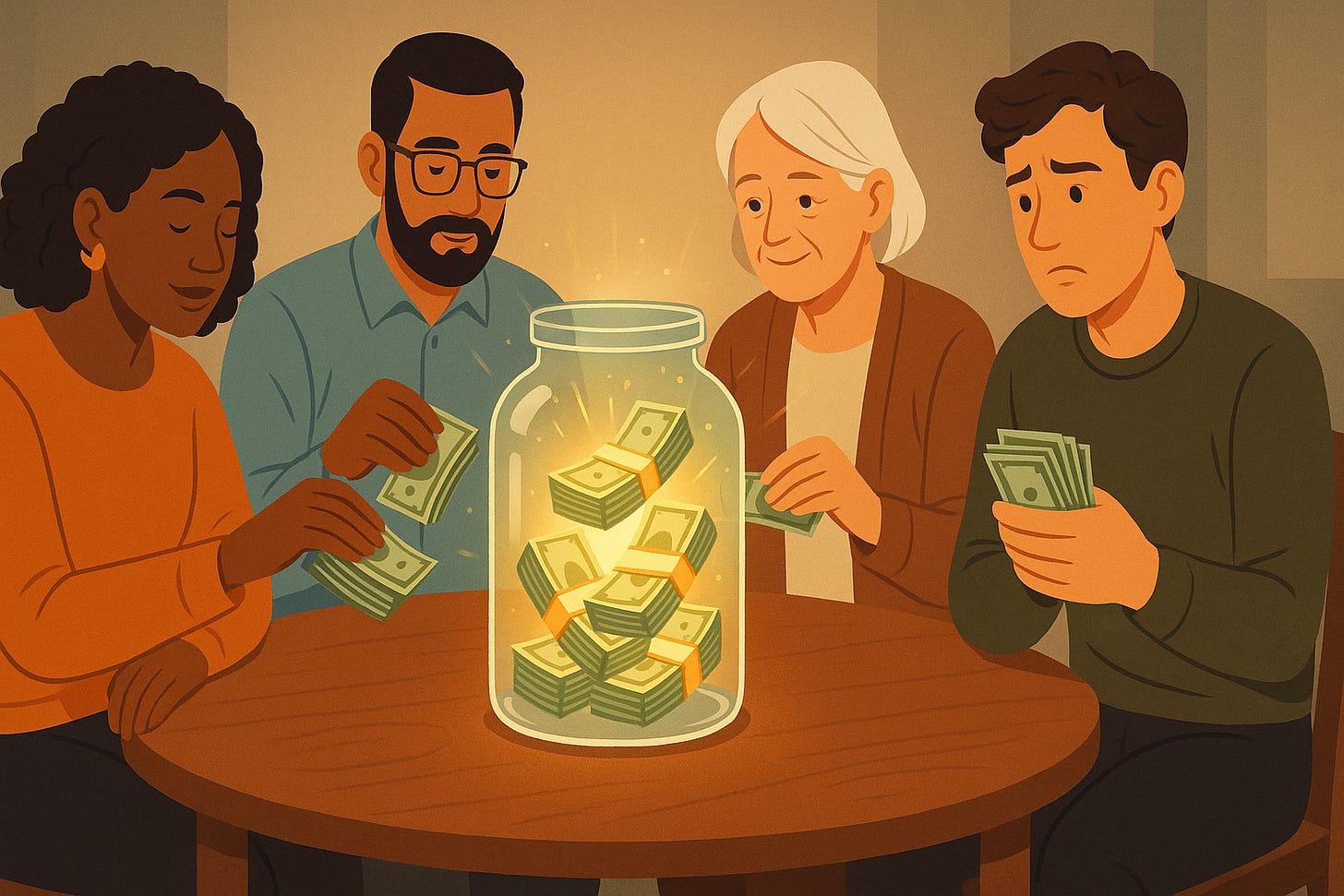Why Should I Help If Others Don’t?
The Public Good Game and What It Reveals About Human Cooperation
You’ve probably heard this in your life—or maybe even said it yourself:
“Why should I recycle if my neighbors don’t?”
“Why should I donate if it’s just a drop in the bucket?”
“Why should I work harder on the group project when others are slacking?”
Behind these questions lies a more profound human dilemma—one that has been studied extensively using a game called the Public Good Game.
The Game That Mirrors Real Life
The Public Good Game is a simple yet powerful experiment used by economists and psychologists to understand how individuals balance their self-interest against the collective benefit.
Here’s how it works:
A group of people—say 4 players—are each given an equal amount of money. Let’s say $10.
Each person decides (in private) how much of their $10 to contribute to a shared pool.
The total in the pool is multiplied by a factor (e.g., ×2) and equally redistributed to all players, regardless of how much they contributed.
Let’s say:
Everyone contributes $5 → the pot is $20 → multiplied to $40 → each person gets $10.
But if only one person contributes $10 and the rest contribute nothing → the pot is $10 → becomes $20 → everyone gets $5.
The twist? You can profit by free-riding—contributing nothing while still receiving a share of the multiplied pot. But if everyone does that? The group gets nothing extra.
Sound familiar?
What This Reveals About Us
The Public Good Game is deceptively simple, but it reveals several profound truths about human behavior:
1. People Are Often More Cooperative Than Expected
Even when the rational, self-interested move is to contribute nothing, many people do contribute. Why?
Fairness: Some feel a moral obligation to give their share.
Trust: Some people assume others will cooperate and reciprocate.
Reputation (in repeated games): Individuals may strive to be perceived as generous or fair.
2. But Cooperation Tends to Decline Over Time
In repeated versions of the game, contribution levels often start high but drop quickly once players see others free-riding.
This mirrors real-world dynamics:
A few people abusing a system can poison it for everyone.
Trust is fragile—once it’s broken, it’s hard to rebuild.
3. Punishment Can Promote Cooperation—But at a Cost
In some versions, players are allowed to punish others who didn’t contribute, usually at a cost to themselves.
Surprisingly, many people are willing to pay to deter free riders. This is called altruistic punishment. It’s not rational in a monetary sense, but it helps enforce social norms and fairness.
Why This Matters Beyond the Game
The Public Good Game isn’t just a lab experiment. It’s a metaphor for life, and it shows up in countless real-world challenges:
1. Climate Change and Environmental Stewardship
Addressing climate change is the ultimate public goods problem. The atmosphere is shared. The cost of pollution is collective. But action often feels optional, and some nations or companies benefit from doing less.
Why recycle, reduce carbon, or go electric if others won’t?
Because, like in the game, if everyone defects, everyone loses.
Even if you think Climate Change has been overstated, the issue is about trying to be good to the planet. There probably is little downside.
2. Taxes and Public Infrastructure
Paying taxes is a tangible contribution to the public good. We fund roads, schools, emergency services, and other essential services.
But tax evasion—or even the perception that others aren’t paying—can erode trust. People start asking:
“Why should I contribute if the rich don’t?”
“Why fund the system if it’s broken?”
Again, trust and fairness drive sustained cooperation.
3. Workplace Team Dynamics
Ever been part of a group project where you did more than your share? That’s the Public Good Game in action.
If people feel like their effort won’t be matched or rewarded, they disengage. If they trust others and see shared investment? They contribute more.
Good leaders know this: shared goals only work when effort is visibly fair.
How to Foster Cooperation in Real Life
So, how can we use what we learn from the Public Good Game to build more cooperative communities, teams, and systems?
1. Make Contributions Visible
In anonymous versions of the game, free-riding skyrockets. But when contributions are public or transparent, people are far more cooperative.
In life:
Acknowledge and reward contributors.
Show impact (e.g., “Your donation helped X people”).
Normalize giving and participation.
2. Create Feedback Loops
When people receive clear, timely feedback—especially about fairness—they’re more likely to stay engaged.
In teams, this might mean:
Regular check-ins
Peer recognition
Balanced workloads
In society, it means transparency and accountability.
3. Enable Fair Punishment (or Reward)
Systems thrive when those who exploit others face consequences—and when those who contribute feel rewarded.
That’s why:
Laws must be enforced evenly
Whistleblowers need protection
Public praise matters
Incentives and accountability are the twin engines of cooperation.
4. Appeal to Shared Identity
When people see themselves as part of a shared “we”, they’re more generous. Framing things as “us versus them” kills cooperation.
Whether it’s climate action or a corporate team, the message should be:
“We’re in this together. Your actions matter.”
Final Thought
Cooperation is natural—but it’s fragile.
The Public Good Game shows us how people want to help, but how quickly they stop when trust breaks down.
It’s a game about fairness. About systems. About seeing your effort ripple out beyond yourself.
In a time where so much feels divided or performative, the lesson is simple but urgent:
If you want people to do their part, show them that everyone else is doing theirs.
And if you’re tempted to hold back because others might be slacking, remember:
The public good doesn’t work unless someone chooses to take the first step.
Why not let that be you?


